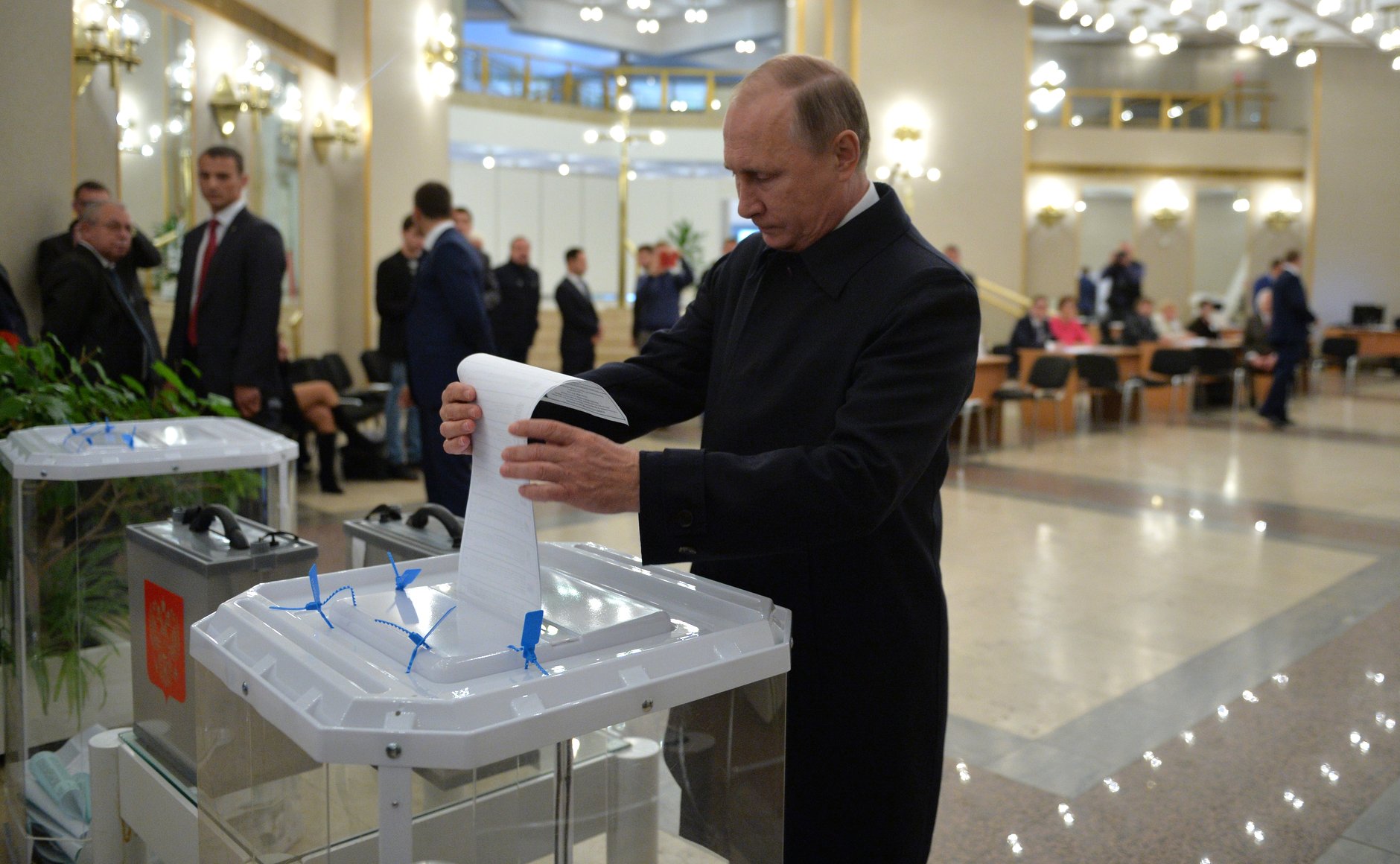
Russian Federation
Russia performs in the low range across all Global State of Democracy (GSoD) categories of democracy. It falls in the bottom 25 per cent of the world with regard to several factors of Representation, Rights, Rule of Law and Participation. In the last five years, it has experienced significant declines in fifteen measures in the GSoD, including Rule of Law, Civil Liberties, Effective Parliament, Absence of Corruption, Economic Equality and more. Russia is an upper middle-income country, heavily dependent on hydrocarbon and mineral exports. The early 2000s commodities boom funded the country’s recovery from the catastrophic post-Soviet transition to a market economy in the 1990s. The rapid economic growth of the early 2000s provided President Vladimir Putin with sufficient public legitimacy to entrench his hold on power, and his increasingly authoritarian rule has been marked by the concentration of powers in the executive branch, emasculation of institutions of representative democracy, electoral manipulation, and pressure on independent media.
In 2014, Russia responded to the Ukrainian Revolution of Dignity by launching a proxy war in the country’s east and illegally annexing Crimea. In February 2022, Russia launched a full-scale invasion of Ukraine. Western nations responded with wide-ranging sanctions that seriously damaged the Russian economy, and Russia responded by cracking down on any and all independent civil society activity, antiwar protest, and remaining media freedom.
Russia is the largest country on earth by land area and a complex multi-confessional and multi-ethnic society, composing roughly four broad socioeconomic groups: Westernized and wealthy urban centers, mid-sized towns and cities dependent on state or major industrial employment, isolated and economically precarious villages, and “ethnic republics” that are a mix of the previous two groupings. In President Putin’s two decades in power, these “four Russias” were controlled through what the Kremlin euphemistically referred to as “managed democracy,” which in turn produced an increasingly personalized leadership system and the progressive depoliticization of various parts of Russian society. The persistence of the current political system lies in its ability to provide sufficient economic spoils to loyal elites while alternatively rewarding and disciplining various parts of Russian society through the provision of adequate economic stability, the stoking of nationalist-conservative sentiment, the maintenance of an encompassing propaganda apparatus, and repressive and deadly violence. In recent years, the sticks of repression and more overt control and censorship of the media and internet have crowded out the carrots of economic growth and personal autonomy as the main tools of governance, culminating in the wide-ranging crackdown on activism and even mild dissent in the wake of Russia’s full-scale invasion of Ukraine.
While the GSoD Indices data show that Russia’s performance on gender quality has been static (at mid-range) for the past several decades, the increasing repression has likely impacted the state of equality. Despite equality guaranteed by law, studies indicate an increase in gender inequality in recent years due to lack of a clear state policy and propaganda that reinforces patriarchal attitudes, making women more vulnerable to violence, discrimination, and lack of political opportunities.
Russia’s political trajectory in the years to come will be determined by the progress of its war on Ukraine. The country is currently undertaking a defensive authoritarian consolidation, but potential elite fractures and the slowly increasing cost of international sanctions may lead to a chaotic breakdown of the current government system. However, the closing-off of public information spaces makes ascertaining the course of public opinion nearly impossible. All feasible outcomes point towards significant declines across measures of democracy as the country continues to depart further from the rule of law in order to maintain its war effort.
Updated: September 2024
https://www.idea.int/democracytracker/
November 2024
“Childfree propaganda” criminalized
On 23 November, President Vladimir Putin signed two bills into law, one on banning “child-free propaganda” (meaning adults actively choosing not to have children) and another on the adoption of Russian children by citizens of countries where it is legal to change one’s gender. Individuals found guilty of the former offense will be subject to fines up to RUB 400,000 (USD 3,900 when the law was passed) and legal entities up to RUB 5 million (USD 47,000). What constitutes “child-free propaganda” is not made explicit in the law. Russian officials have said the purpose of the laws is to raise Russia’s birth rate, defend “traditional values”, and defend the Russian people from, in the words of one of the bill’s authors, “a hybrid war aimed at population reduction.” While authorities have stressed women will not be legally punished for declining to have children, public statements encouraging women to not have, or to have fewer children, will be subject to the law.
October 2024
Rights of Central Asians under increasing pressure
Since the deadly terrorist attack at Crocus City Hall in Moscow in March, Russian officials have increasingly infringed on the rights of Central Asian migrants, engaged more frequently in anti-migrant rhetoric, and passed legislation restricting migrant rights in July. The legislation permits police to deport non-citizens without a court order for a wide range of offenses, and deportations in the first seven months of 2024 were up 53 per cent compared to 2023. Attacks and violent raids on businesses where migrants work occur more frequently, and a raid in Yekaterinburg in August where police permitted nationalist volunteers to harass and steal from Central Asian market vendors made national headlines. Nineteen regional authorities across Russia have banned migrants from a wide range of occupations, and increased bureaucracy of migrant-dominated fields like taxi driving have put migrants at higher risk of discrimination. An estimated 3.5 million Central Asian migrants live in Russia, and researchers noted in October the government had stopped providing statistics on migration.
Sources: iStories, Meduza, International IDEA, 66.ru, Lenta.ru, Radio Free Europe/Radio Liberty
New state budget most secretive in post-Soviet history
The budget the Russian government submitted on 30 September to the State Duma for the years 2025-2027 is set to be the most secretive in the country’s post-Soviet history, with an estimated 31.6 per cent of expenditures marked as classified. An estimated 22.6 per cent of the 2023 budget and 26.8 per cent of the 2024 budget were classified. Analysts suggest the increase is an attempt to obfuscate the amount of state spending being directed to the military, and investigative outlet The Bell noted that even once relatively open Russian business media outlets had refrained from discussing the budget in detail. Military expenditures have also historically been a major source of graft and corruption in Russia.
Messaging App Discord blocked
Russian media and internet censor Roskomnadzor banned and blocked the messaging and voice over internet protocol (VoIP) app Discord on 8 October, citing failure to comply with a 1 October order to remove 947 pieces of content ostensibly related to terrorism, extremists, drugs, or other “illegal information.” Russian law bans the promotion of what regulators deem extremist, terrorist, or drug-related content. Few legal criteria defining these terms exist in Russian law and regulators and prosecutors are given broad leeway. Russian censors have progressively blocked more and more Western-founded apps since the full-scale invasion of Ukraine and the government encourages Russian users to adopt locally-owned alternatives.
Source: TASS, Deutsche Welle, International IDEA
September 2024
Russians to avoid prosecution via military service
Russian President Vladimir Putin signed a law on 3 October that allows criminal defendants to avoid prosecution if they are either called up for mandatory military service or if they voluntarily sign a contract to serve in the armed forces. Reports of ad hoc arrangements being made between defendants and prosecutors have circulated before, but the practice was not previously systematized or legally sanctioned. Rights activists and lawyers have warned the harsh pre-trial detainment process, as well as exaggerated charges, are being leveraged to pressure defendants into enlisting, as well as providing violent offenders facing lengthy sentences a faster route to return to society.
Sources: iStories, Radio Free Europe/Radio Liberty, Verstka Media
VPNs disappearing from the Russian internet
Apple removed 50 virtual private network (VPN) apps from its App Store from July to September 2024, reportedly double the number it was asked to remove by Russia’s internet censor Roskomnadzor. This brings the total number of VPNs no longer accessible inside Russia on Apple devices to 98, making it the most restrictive App Store outside China. The removals are part of a long-term effort by Roskomnadzor to control the online information environment and prevent access to material critical of or unfavourable to the government.
Sources: El Pais, Moscow Times, Roskomsvoboda
Propaganda to account for 12 per cent of class time
An analysis of changes in Russia’s primary and secondary school curricula found that the number of classroom hours dedicated to propaganda grew from less than 500 in 2022 to over 1,300 in 2024. The investigative media outlet Agentstvo’s mapping of Russian school curriculum found that 12 per cent of classroom instruction hours are now to be dedicated to military training, lessons on the invasion of Ukraine, the “preservation of traditional Russian spiritual and moral values” and the importance of large families. The changes are the latest and most significant in the efforts to reshape the Russian education system to break both institutional and intellectual ties with the West and instead focus on nationalist narratives.
Sources: Agenstvo Media, BBC Russian, Washington Post
August 2024
YouTube and Signal blocked
On 9 August, the Federal Service for Supervision of Communications, Information Technology and Mass Media (Roskomnadzor), blocked the encrypted messaging app Signal inside the country, saying it violated Russian legislation against terrorism and extremism. The state also progressively “throttled” YouTube in August – not legally banning or blocking the site but limiting the site’s internet bandwidth and making it impossible to use. YouTube was the last remaining significant Western social network or platform available in the country. While both services can still be accessed in some capacity using virtual private networks (VPNs) or technical workarounds, the blocks mark the end of their status as online cultural phenomena that were not under the direct control of or closely surveilled by the Russian state.
Sources: Meduza, Reuters, CEPA
UPDATE: YouTube access was suddenly restored on 15 November. The circumstances of and reason for the reversal remain unclear. Russian ministries have insisted for months that problems with YouTube were the result of inferior Google infrastructure in the country.
Sources: Meduza (1), Meduza (2), Reuters, CEPA,
See all event reports for this country
Global ranking per category of democratic performance in 2023
Basic Information
Human Rights Treaties
Performance by category over the last 6 months
Blogs
Election factsheets
Global State of Democracy Indices
Hover over the trend lines to see the exact data points across the years
Factors of Democratic Performance Over Time
Use the slider below to see how democratic performance has changed over time


